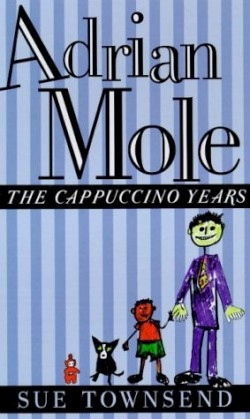
Adrian Mole
The Cappuccino Years
Even if truth is stranger than fiction, Townsend has been giving truth a run for its money in the person of Adrian Mole, her fictitious English diarist whose life and predicaments were nicely captured in his self-description from an earlier book: “I have a problem. I’m an intellectual, but at the same time I’m not very clever.”
He’s an odd duck, hapless one moment, insightful the next, and lovable most of the time. The world he chronicles in his diaries is much like that of common man except the spotlight is on the more absurd qualities of contemporary parenthood, politics, personal relations, and media.
This is Townsend’s sixth book in the Mole series. It was released last year in Great Britain, where Mole has a large following. The Mole diaries have sold millions of copies and have been adapted for radio, television, and the stage. Townsend’s other novels include Rebuilding Coventry (1988), The Queen and I (1992), and Ghost Children (1998).
The earlier diaries chronicled Mole’s years from adolescence to young adulthood. Those were the Margaret Thatcher years, when kids at Mole’s school were nearly expelled for wearing red socks. In The Cappuccino Years, Mole is thirty years old and despite the literary aspirations of his youth he is making a precarious living as a chef. Tony Blair is ascendant, and some of Mole’s acquaintances expect pound notes to start falling from heaven at any moment.
As a schoolboy, Mole pined for Pandora Braithwaite, and he’s still pining for her as she stands for election to Parliament, where she intends to be the “brightest star in Blair’s firmament.” Mole’s parents are still playing sexual mix and match games, in this case with Pandora’s parents. Some things have changed. Now there are stores that sell shoes guaranteed to earn respect at school for Mole’s newly discovered illegitimate son. The price is exhorbitant, and Mole balks at paying it, but eventually he does. In the image-conscious 1990s, it would be cruel to send a kid to school in the wrong shoes.
Mole no longer writes solemn poetry of his youth, but he does write screenplays, which meet with the same indifference as did his poetry.
Virtually plotless, written with humor that runs the gamut from potty jokes to sly political commentary, the latest installment of Mole’s life reveals a man who is at once repelled by and attracted to the self-indulgent, media-fixated culture of 1990s middle-class London. He wants his fifteen minutes of fame but he can’t abide the superficiality and sheer wrong-headedness of the television producers who can offer it to him. “I feel alone in a parallel universe,” he writes.
Then, through several strange twists of fate, he becomes a television celebrity. It doesn’t change anything, because everybody promptly ignores him.
Reviewed by
Rich Wertz
Disclosure: This article is not an endorsement, but a review. The publisher of this book provided free copies of the book to have their book reviewed by a professional reviewer. No fee was paid by the publisher for this review. Foreword Reviews only recommends books that we love. Foreword Magazine, Inc. is disclosing this in accordance with the Federal Trade Commission’s 16 CFR, Part 255.
